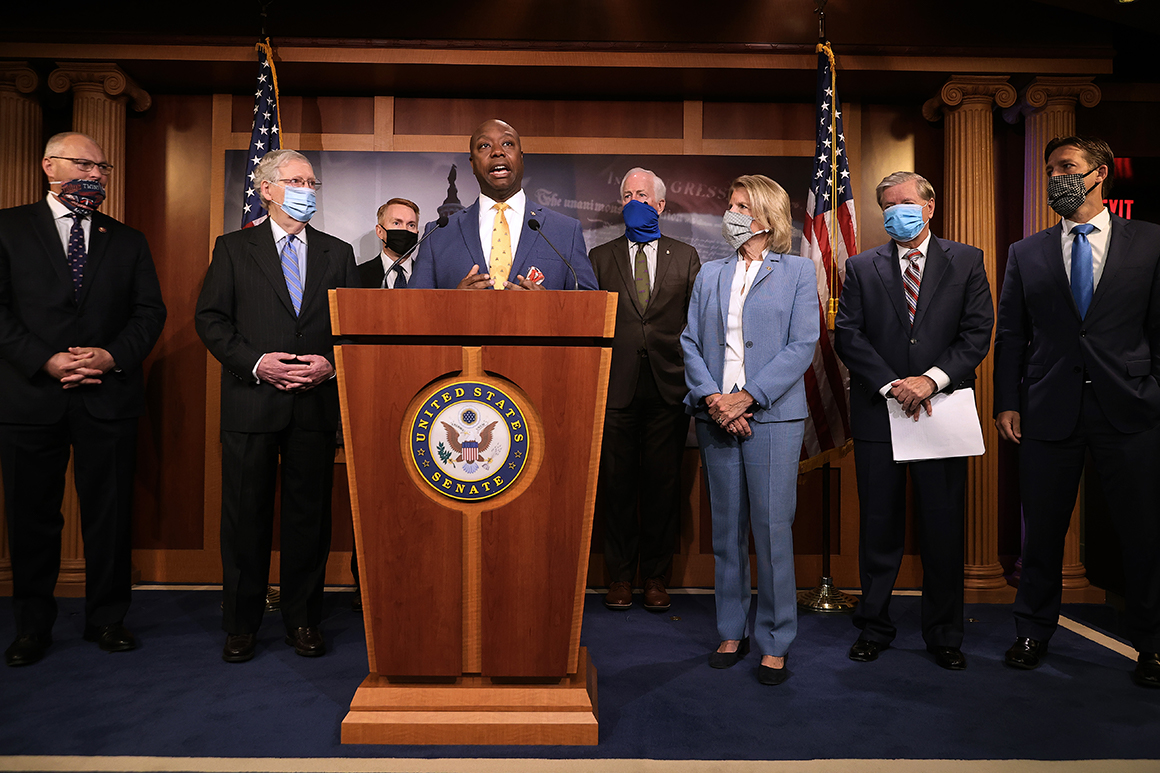
“It’d be a waste of my time,” said Senate Judiciary Chairman Lindsey Graham (R-S.C.) of bringing Sen. Tim Scott’s bill to his committee, where it could be more easily amended by Democrats. “Committee or floor, that’s not the issue. The issue is whether or not they want to get a result. Clear to me they don’t.”
“Our members are united: Tim Scott put together a really solid bill that deserves a chance to at least be debated,” said Senate Majority Whip John Thune (R-S.D.).
Members of both parties are hesitant to fully declare the effort dead in the middle of nationwide protests and anger over the police killings of Black Americans. The House will pass its own police reform bill on Thursday, which imposes stronger federal policing standards than Scott’s, including by putting an end to chokeholds and no-knock warrants and loosening rules protecting police from being sued.
But absent a lightning strike breakthrough, there will not be a new sweeping reform law before the election. The Senate is likely to move onto annual defense legislation, then a bill to provide aid amid the coronavirus crisis, before breaking for August recess. After that, little major legislation is expected before November.
Democrats said they hoped to resurrect their March strategy on coronavirus relief: Vote down McConnell’s unilateral approach and force him to the table. If McConnell were really serious about making a law as he insists, they argue, he’d continue to engage with them.
“The moment for there to be a negotiation about what or might not actually pass is after it’s clear that we’re not going to just simply proceed with” the GOP bill, argued Sen. Chris Coons (D-Del.).
But Sen. Joe Manchin (D-W.Va.), one of just three Democratic Caucus members that voted to advance the bill on Wednesday, surmised: “I’m not sure that this type of pressure’s going to work this time.”
Manchin questioned whether McConnell even wants something to pass, while also taking Democrats to task for their tactics.
“For some reason, they don’t understand we’re not in the majority. OK? The wish list? I wish all that would happen. It should go through committee,” Manchin said of his colleagues’ demands. “But that’s not the way McConnell’s going to work. You can’t force that.”
The failure of the Senate GOP’s police bill was not a surprise given Democrats’ criticism of McConnell’s approach earlier this week.
Even as Republicans offered to hold an open amendment process, Democrats said the bill was “not salvageable” and needed a total do over. The first real bipartisan meeting between key lawmakers like Graham, Scott and Sens. Kamala Harris (D-Calif.), Cory Booker (D-N.J.), Dick Durbin (D-Ill.) and Marco Rubio (R-Fla.) didn’t occur until Tuesday, a day before the vote.
Yet even if the result was predictable, the raw emotion from individual senators was real on Wednesday afternoon as they sifted through the wreckage. Sens. Tim Kaine (D-Va.) and Ben Sasse (R-Neb.) even briefly debated Senate procedure on the floor, a relative rarity these days.
And a large group of senators watched and applauded Scott after he gave an emotional speech, during which he accused Democrats of strategizing against Republicans so as to “not allow this party to be seen as a party that reaches out to all communities in this nation.”
“Really where they’re positioning themselves is that somehow Republicans can’t be for police reform, that only Democrats can,” fumed Sen. Chuck Grassley (R-Iowa). “And they resent very much Sen. Scott being a Black American taking this lead.”
Senate Minority Leader Chuck Schumer (D-N.Y.) retorted that civil rights groups had urged a filibuster, arguing the bill could not be saved: “Who do you believe, America? NAACP or the Republican caucus?”
The answer will probably be answered in four months at the ballot box. And both parties started honing their arguments on Wednesday.
Republicans will say Democrats engaged in pure obstruction, potentially blocking their bill from even being debated multiple times if McConnell follows through on his pledge to force more votes. They will say that Democrats want to win an election and pass their own legislation next year. And the frustration is coming even from Republicans who don’t walk the party line.
“They’d rather have a campaign issue than actual police reform,” said Sen. Mitt Romney (R-Utah), flashing sarcastic frustration with Democrats. “Oh yes. We could send it back to committee and long debates and we’d be months and then we’d be in the August recess.”
Democrats will say McConnell merely wanted a “show vote” that he knew couldn’t pass but puts senators on the record. Partisan bills that get dropped on the floor without committee buy-in rarely succeed, they say, evidence that the GOP didn’t want a result, they just wanted to criticize Democrats.
“That’s not how we get things done here. They know it, we know it. We’ve all been around,” said Sen. Patty Murray (D-Wash.), a member of Democratic leadership.
While the partisan deadlock might have been predictable, what follows outside the halls of the Capitol is anyone’s guess. If Americans who have been protesting for weeks realize that Congress is failing them, will they step up their dissent? Or will the issue fade away until the next high-profile bout of police misconduct, only to return to Congress to precisely where it started?
Scott has his own prediction. And it’s not an upbeat one.
„We’ll move on. People will forget about it. And you know what’s going to happen? Something bad,” Scott said. “And we’ll be right back here talking about what should have been done.”
Source: politico.com
See more here: news365.stream






